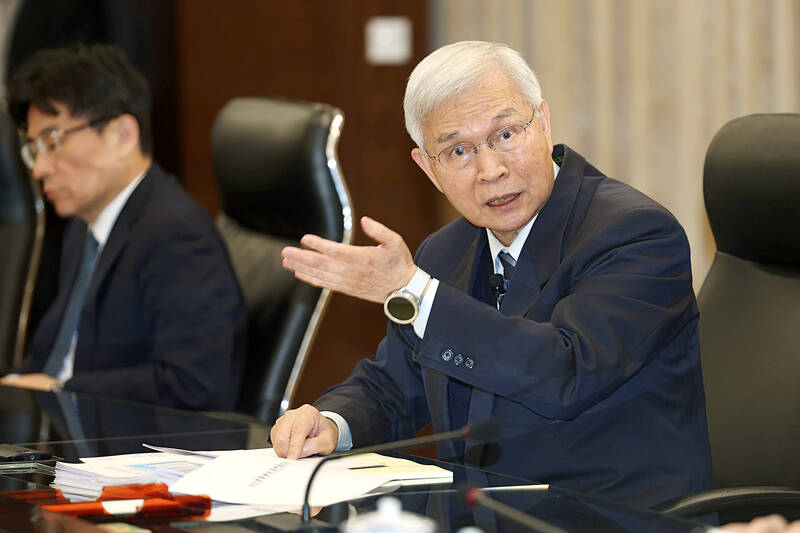The US Department of the Treasury has retained Taiwan on its currency monitoring list, a move that reflects smooth communication between Taiwan and the US, and the absence of appreciation pressure on the New Taiwan dollar amid efforts to ease bilateral trade imbalances, the central bank said yesterday.
The treasury department on Thursday delivered its semiannual report to the US Congress on macroeconomic and foreign exchange policies of major US trading partners and named nine economies, including Taiwan, on the monitoring list.
Other economies on the list are China, Japan, South Korea, Singapore, Vietnam, Germany, Ireland and Switzerland.

Photo: CNA
The US’ trading partners are evaluated based on three criteria: a bilateral goods trade surplus with the US exceeding US$15 billion, a current account surplus above 3 percent of GDP and net foreign exchange purchases exceeding 2 percent of GDP over a 12-month period, the treasury said.
For decades, unfair currency practices abroad have contributed to the US’ trade deficit and hollowed out US manufacturing, the treasury said on its Web site
The department said it would continue to closely monitor whether trading partners engage in foreign exchange interventions or employ non-market policies to manipulate their currencies, adding that such actions could undermine US economic recovery and create unfair competitive advantages.
Taiwan’s trade surplus with the US reached US$74 billion last year, while its current account surplus stood at 14.2 percent of GDP, the central bank said yesterday, citing the US report.
However, the central bank sold its holdings of greenback by US$16 billion to stabilize the local currency, a sum equivalent to 2.1 percent of Taiwan’s GDP, it said.
Taiwan met two of the treasury’s three criteria for inclusion on the monitoring list: a significant trade surplus with the US and a current account surplus above the designated threshold, driven by US technology giants’ purchase of chips and other electronic components used in smartphones and artificial intelligence infrastructure, the central bank said.
The report indicated that Washington would continue monitoring potential risks in the non-bank financial sector, including foreign exchange risks, and that Taiwan’s central bank interventions should be limited, allowing exchange rates to move in line with underlying economic fundamentals, the central bank said.
The suggestions confirmed that “there had been no US request for appreciation of the local currency,” the central bank said, following an 8 to 9 percent appreciation of the NT dollar against the US dollar in recent weeks.
Some observers have said that the recent appreciation of the NT dollar reflects Taipei’s efforts to placate Washington during ongoing bilateral trade talks.
However, the central bank has reiterated that the currency’s rise is primarily driven by Taiwan’s strong first-quarter GDP growth, currency speculation by foreign capital and concerns among local exporters over potential exchange rate losses.
Communication with the US Treasury remains smooth and constructive, and Washington’s recommendations are largely aligned with its own monetary and exchange rate policies, it said.
The NT dollar has stabilized since the middle of last month, the central bank added.

Taiwan is projected to lose a working-age population of about 6.67 million people in two waves of retirement in the coming years, as the nation confronts accelerating demographic decline and a shortage of younger workers to take their place, the Ministry of the Interior said. Taiwan experienced its largest baby boom between 1958 and 1966, when the population grew by 3.78 million, followed by a second surge of 2.89 million between 1976 and 1982, ministry data showed. In 2023, the first of those baby boom generations — those born in the late 1950s and early 1960s — began to enter retirement, triggering

ECONOMIC BOOST: Should the more than 23 million people eligible for the NT$10,000 handouts spend them the same way as in 2023, GDP could rise 0.5 percent, an official said Universal cash handouts of NT$10,000 (US$330) are to be disbursed late next month at the earliest — including to permanent residents and foreign residents married to Taiwanese — pending legislative approval, the Ministry of Finance said yesterday. The Executive Yuan yesterday approved the Special Act for Strengthening Economic, Social and National Security Resilience in Response to International Circumstances (因應國際情勢強化經濟社會及民生國安韌性特別條例). The NT$550 billion special budget includes NT$236 billion for the cash handouts, plus an additional NT$20 billion set aside as reserve funds, expected to be used to support industries. Handouts might begin one month after the bill is promulgated and would be completed within

One of two tropical depressions that formed off Taiwan yesterday morning could turn into a moderate typhoon by the weekend, the Central Weather Administration (CWA) said yesterday. Tropical Depression No. 21 formed at 8am about 1,850km off the southeast coast, CWA forecaster Lee Meng-hsuan (李孟軒) said. The weather system is expected to move northwest as it builds momentum, possibly intensifying this weekend into a typhoon, which would be called Mitag, Lee said. The radius of the storm is expected to reach almost 200km, she said. It is forecast to approach the southeast of Taiwan on Monday next week and pass through the Bashi Channel

NO CHANGE: The TRA makes clear that the US does not consider the status of Taiwan to have been determined by WWII-era documents, a former AIT deputy director said The American Institute in Taiwan’s (AIT) comments that World War-II era documents do not determine Taiwan’s political status accurately conveyed the US’ stance, the US Department of State said. An AIT spokesperson on Saturday said that a Chinese official mischaracterized World War II-era documents as stating that Taiwan was ceded to the China. The remarks from the US’ de facto embassy in Taiwan drew criticism from the Ma Ying-jeou Foundation, whose director said the comments put Taiwan in danger. The Chinese-language United Daily News yesterday reported that a US State Department spokesperson confirmed the AIT’s position. They added that the US would continue to